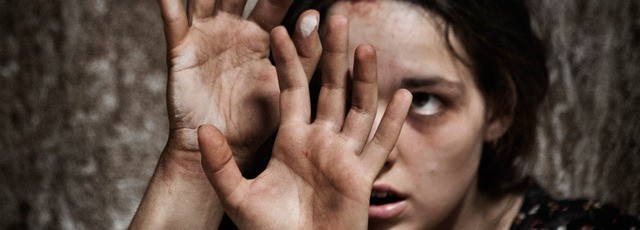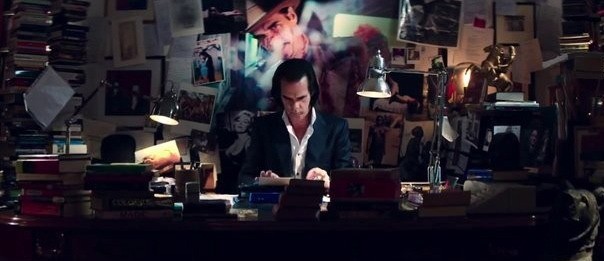-
SALVO (Fabio Grassadonia, Antonio Piazza 2013)--ND/NF
FABIO GRASSADONIA, ANTONIO PIAZZA: SALVO (2014)--ND/NF

SARA SERRAIOCCO IN SALVO
A new pair of filmmakers to reckon with in Italy
My sympathies were with Fabio Grassadonia and Antonio Piazza's first feature Salvo all the way, even when it disappointed expectations early on with its strange jump from a gun battle and mafia killing to an almost too close and prolonged focus on a beautiful blind girl, a relative of the assassinated man, who somewhat implausibly regains her sight. It's a wholly original mix, and the assassin, who goes into hiding in Sicily, where all this transpires, with the blind girl, has some of the chiseled, laconic mystery of Alain Delon in Jean-Pierre Melville's classic Le Samouräi. But the filmmakers are trying to pull a fast one on us, bringing out all the trappings of an Italian gangland thriller and just letting them wither away. That stuff is durable. It can't wither away. However the Sicilian interiors, overdecorated and decrepit in a Victorian-Italian way, the industrial exteriors, rusty, clanging and abandoned to mafiosi, are memorable. So is the light. And so are Palestinian actor Saleh Bakri as the assassin (who may bring Chemises Lacoste back in style), and Sara Serraiocco as the blind girl he literally loves to death. Talk about doomed romances. This is a genre-bender, with elements of noir thriller and operatic romance and some of the images, dialogue and pace of spaghetti western.
And there is the memorably odd piccolo-borghesi couple (played by Giuditta Perriera and Luigi Lo Cascio) at the first hideout, an old apartment, who serve Salvo (whose name,rather ironically, means "safe," as in "sano e salvo," "safe and sound," as well as being short for the common Sicilian name, Salvatore). And also Mario Pupella as the gnarly mafia boss who comes, in vain as it turns out, to call Salvo back to to do his duty, and kill.
But first of all Salvo (no name though till much later, when Rita, the blind girl, asks for it), a bodyguard, is cornered by some rival assassins on a road, and captures one and forces him to say who set them on him ("Renato") then executes the man. The scene shifts to Renato's house (darkened against the Palermo heat) and a long remarkable single-take sequence focused on Rita, at first sitting at a table listening to her favorite song, "Arriverà" by the Modà and Emma, and happily counting money, then gradually realizing that danger and death have invaded, and moving around gradually in growing terror. Remarkable sound design, light (dim, yet revealing), and acting by Sara Serraiocco introduce us at perhaps slightly overindulgent length to the sheer sensuality of this film and its ability to convey an unusual point of view. At this point, Renato is not there. Hence the waiting.
Then Renato comes and the killing takes place, though we don't see it, because we're still with Rita. Somehow Salvo can't bear to treat her as necessary collateral damage, and keeps her a prisoner. Boyd van Hoeij gives an excellent (and justifiably admiring) description of all this in his Cannes Variety review. It's virtuoso work that, even if Grassadonia and Piazza don't gain a wide audience with this offbeat debut, will guarantee them attention from cinephiles in future both for richness of technique and originality of concept. And when von Hoeij says, in the traditional Variety lingo, "Tech package is simply superb," these are not idle words.
However von Hoeij is unfortunately also right to suggest the second half doesn't wholly mesh with the first or match its originality. This long finale ranges between the dingy apartment and an abandoned factory warehouse where Salvo's keeping Rita prisoner, and then on to an escape when a bunch of mafiosi associates come and boss Mario Pupella orders Salvo to finish her off. This whole second half feels a bit like back-peddling, especially considering the high energy and physical intensity of the earlier section. But the finale scene is wonderfully iconic and austere.
Screening for this review as part of the New Directors/New Films 2014 series (of MoMA and the Film Society of Lincoln Center) one had the feeling that the press and industry audience had a very mixed reaction, some obviously unsatisfied, others simply not knowing quite what to make of it. But parts of this film are clearly brilliant and highly original. Salah Bakri is riveting. He isn't as handsome as the young Delon but he has the stoical assurance, upright bearing, and ability to hold the screen in thrall. And Sara Serraiocco's blind act and transformation into a beautiful sound young woman keeps pace with Bakri's mysterious strength. Given the generally low blood pressure of contemporary Italian cinema, anything this original and assured is good news. What the directors do from here forward we'll have to wait and see.
Salvo, 104 mins., debuted at Cannes May 2013 where it won the Critics' Week grand prize. A French and Italian co-production which Jeanne Moreau had something to do with. In the US it's a Film Movement release. Released in France 16 Oct. 2013 with a good critical reception (Allociné press rating: 3.4) and Les Inrockuptibles loved it, but Cahiers thought it too showoff-y, more a directors' calling card than a film; and others argued (not without reason) that it lacks narrative backbone. It was screened for this review as part of the FSLC-MoMA series, New Directors/New Films, showing Sat. 29 Mar., 2014 at 9pm at MoMA and Sun. 30 Mar. at 4pm at Lincoln Center.

SALEH BAKRI IN SALVO
Last edited by Chris Knipp; 08-31-2014 at 09:05 PM.
-
20,000 DAYS ON EARTH (Ian Forsyth, Jane Pollard 2014)--ND/NF
IAN FORSYTH, JANE POLLARD: 20,000 DAYS ON EARTH (2014)--ND/NF

NICK CAVE WRITING ON HIS TYPRWRITER IN 20,000 DAYS ON EARTH
An immersive fiction-stye self-portrait by the Australian Nick Cave
For those wanting or needing a fill-in on Nick Cave, the Australian-born, long UK-resident singer-songwriter, there will be some gaps after watching this film, but it makes up for that in a nearly non-stop visit with the man, who, collaborating with writer-directors Ian Forsyth and Jane Pollard, wisely eschews the conventional vintage tapes and straightforward bio in favor of a Shandean tale enabled by lots of talk about himself in the present time, semi-magical, noir-ish conversations with old friends (including Ray Winstone and Kylie Minogue) and wife in the light tan leather seats of his black Jaguar (as he drives around his chilly wet resort town of Brighton), expounds to a shrink, and visits his archive where attendants go through photo files and he identifies himself at various stages, in elementary school, in grammar school, in his tiny hideaway in Berlin. It's an elegant fiction-style film worthy of the man's originality, intelligence and wit. It culminates with "climactic concert footage of Cave and the Bad Seeds performing explosive renditions of 'Higgs Boson Blues,' 'Jubilee Street' and 'Stagger Lee' at the Sydney Opera House," "well timed to allow for catharsis after so much formal control and highbrow talk" (Rob Nelson, Variety). And this segment, it might be added, cunningly inserts some split-second overlap-clips showing Cave performing similarly at earlier stagesof his now considerable career.
The sessions with the shrink are artificial and expository. It may be said that nothing is more static cinematically than exposition constructed via shrink sessions; yet they were used in "The Sopranos" with success and added interest and contrast there. Cave tells the shrink his father died when he was 19. He does not say he learned of the death from his mother as she was bailing him out of jail for burglary; that it was the time in his life when he was most confused. "The loss of my father created in my life a vacuum, a space in which my words began to float and collect and find their purpose," he has said. This comes through in the film: like so many of us, he wove meaning out of confusion through writing.
He notes to the shrink that he was a drug addict, which he was told was a dangerous way to behave. He also recounts that his father read him the opening chapter of Nabokov's Lolita when he was a young boy, an important moment of rapport. He composes the lyrics to his songs tapping on a small manual portable typewriter. The results are cut out and pasted into a notebook he props up on a piano to sing them. He dresses in the same dark suits to walk around and perform on stage. His present wife when he first saw her (he recounts this as she sits in his Jaguar behind him) embodied all the movie stars and models and divas and beauties in history and paintings he'd ever seen.
There is a wealth of music in the background, but this is not a music film, rather a film about a musician and writer. (He penned the script of the striking Australian film The Proposition, though this is not mentioned.)He is shown, using the collaged notebook of lyrics, with his musicians the Bad Seeds recording their 2013 album Push the Sky Away, and here we see he composes quite interesting words. But this moment, of interest to viewers learning consciously of Cave's lyrics for the first time, does not arrive till 50 minutes into the film.
The film does not discuss the extremely eclectic nature of Cave and his various groups' music, nor name or date his earlier groups (though with his current group they mention a line he's singing sounds like Lionel Richie, which sounds plenty eclectic). It does not say when he moved to England (in 1980, when he was 23) or why. It doesn't mention that he has written novels. It mentions his twin sons born with his current wife former model Susie Blick, but it does not mention his other sons by two other women, or the six years after his time in West Berlin when he lived in São Paulo, Brazil, where he was married to Brazilian journalist Viviane Carneiro and had a son, Luke.
In short, this is not a thorough review of Nick Cave's life and work. It is, however, an artistic and engaging portrait of the man that fans and others may enjoy. But "While the film is seemingly accessible as a portrait of an artist who seems particularly attuned to his own creative process, and particularly adept at describing this attunement, it's unlikely that many who aren't already whole-hog Bad Seeds fans would be able to stomach much of Cave's self-styled pomposity" (Slant Magazine). This comment is a bit unfair: he is humorously self-aware about his self-centeredness, noting that in an old mock-last will and testament he provided that all proceeds from his estate were to go to "The Nick Cave Memorial Museum."
Some of Cave's generalizations about the creative process in the film are rather over-general and obvious. But his opening statement about how you compose a song is interesting as a talking point. "Songwriting is about counterpoint," he says, "like letting a child into the same room as a Mongolian psychopath or something." He suggests a song (the lyrics that is) brings together two unrelated and contrasting things, and sometimes a third thing. This resembles the famous definition of surrealism as "the random encounter between an umbrella and a sewing-machine upon a dissecting-table."
20,000 Days on Earth , 95 mins., is a Drafthouse Films release. It debuted 20 Jan. 2014 at Sundance. It was screened for this review as part of the FSLC-MoMA series New Directors/New Films, of which it is the closing night film showing Sun., 30 Mar at 7 pm and 9:30pm. at the Film Society of Lincoln Center. This film will be distributed by Drafthouse Films with release date 17 September 2014.
Last edited by Chris Knipp; 08-31-2014 at 09:00 PM.
-
 Selects
Selects
FEBRUARY 17-27 2014 PUBLIC SCREENINGS

MARCH 19-30 2014
PUBLIC SCREENINGS
Rating New Directors/New Films 2014; comments on Film Comment Selects
Though New Directors features some provocative and radical new work, some of the films, the best, were straightforward dramas that had resonance with our times of worry, paranoia, and economic and environmental crisis. Top marks to the two Romanian features, The Japanese Dog (Jurgiu ), the story of a father devastated by flood reunited with his expatriate son, and Quod Erat Demonstrandum (Gruzsnetczki ), a tale of Eighties intellectual repression, which are not groundbreaking in technique but simply well-made and relevant films. A sparkling Chinese debut was Trap Street (Qu), a romance with a nod to government oppression. The Israeli Youth (Shoval) is a kidnapping thriller full of economic and job desperation. The Italian Salvo (Grassadonia, Piazza), with impressive performances and virtuoso technique rings changes on the mafia thriller, blending in a doomed romance and exalted spaghetti western style, another strong debut. There were a couple of powerful documentaries: Return to Homs (Derki), following young Syrian rebels up so close the filmmaker risked his life constantly, is an absolute must-see; We Come As Friends is another important statement about the exploitation of Africa, South Sudan this time, but not as coherent as Hubert Sauper's earlier Darwin's Nightmare.
Other New Directors films were certainly worth seeking out, such as Ayoade's The Double, a polished Brazil knockoff, but not as great and warm as Ayaode'sSubmarine. Obvious Child (Robbespierre) is a successful US female comedy; Salvation Army (Taïa) is a beautifully stark, pioneering gay film from Morocco. And there are many other more radical titles of interest for various reasons that are what give the series its depth and character.
This is still a great series and it was a great pleasure and an honor to be able to watch every one of the feature-length selections. Special thanks to John Wildman FSLC Senior Publicist and David Ninh Publicist for all their help in covering the series and keeping it running so smoothly; to all the staff at the Film Society and MoMA; to Glenn Raucher of the Film Society, Theater Manager, who keeps the theaters providing world class screening quality.
I liked the Film Comment Selects titles I chose, Felony (Saville), Me & You (Bertolucci), Cherchez Hortense (Bonitzer), Our Sunhi (Hong), but can't list "best of" this series because as before, it was impossible to sample a large enough chunk of this more eclectic and chronologically free-ranging series.

FSLC Programming Director Dennis Lim
Last edited by Chris Knipp; 01-01-2015 at 05:40 PM.
 Posting Permissions
Posting Permissions
- You may not post new threads
- You may not post replies
- You may not post attachments
- You may not edit your posts
-
Forum Rules






 Reply With Quote
Reply With Quote
 Selects
Selects


Bookmarks